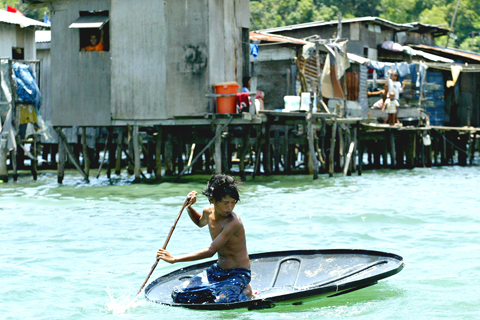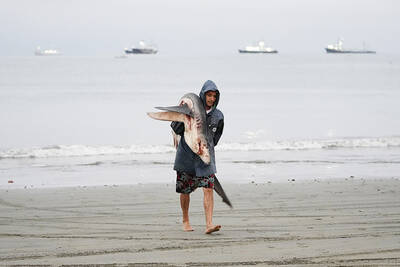Migrants from the Philippines and Indonesia who have flooded into Malaysian Borneo are being targeted with a massive deportation program, as the government comes under pressure to act.
The settlers have been blamed for waves of crime and creating a generation of stateless children who live in appalling conditions in the towns and villages of Sabah state.
The influx of mostly Muslim migrants has also tipped the ethnic balance against indigenous tribes who used to dominate the population, say politicians in Sabah, which is struggling to cope with the influx.

PHOTO: AFP
After a poor result in March elections that made it more sensitive to voter gripes, the national government has announced a mass crackdown to send the illegal migrants back to their home countries.
“The people there do not recognize the borders. They move in and out due to economic opportunities in Sabah,” Malaysian Deputy Prime Minister Najib Razak said recently, promising that a “large scale” operation would begin this month.
Sandwiched by the Philippines in the north, and Indonesia’s Kalimantan to the south, resource-rich Sabah has for decades been a magnet for immigrant workers who labor on construction sites and oil palm plantations.
“This problem has a very long history and many observations have been made on illegal immigrants. The people here know this crisis goes back to the ’70s,” said Cabinet minister Bernard Dompok, who hails from the region.
Dompok, leader of the UPKO party which is part of the Barisan Nasional coalition that has ruled Malaysia for half a century, said Sabahans have becoming increasingly concerned about the number of foreigners.
“I think the focus of those involved in illegal immigration during that time was to ensure there was a change in the demography of Sabah’s population,” he said. “But of course today, in the whole of Sabah, no matter what race or origin or religion, the people are now worried over this perennial problem.”
Sabah’s Deputy Chief Minister Joseph Pairin recently described the problem as “threatening the peace and security in the state” and likened it to a time bomb which could explode if not defused.
Official data say a quarter of the state’s 3 million inhabitants are “foreigners,” but the number of illegals is not known. Pairin said it could be as high as 1.5 million while civil society groups estimate 1 million.
Najib has said that at least 100,000 to 150,000 people will be deported in the first phase of an ongoing program that will continue until the state is clear of illegal migrants.
In the markets and on the street corners of Sabah’s capital, Kota Kinabalu, migrant children beg for money or try to sell plastic bags to earn a few coins.
Some as young as nine years old can be seen sniffing glue — aid workers say it is a common pastime here — and at night, those who have no homes to go to shelter in cardboard boxes discarded at the market.
“The main problem is they do not have identification and without this, they cannot go to school, so many end up as child labour,” said Aegil Fernandez from rights group Tenaganita.
It conducted a survey that found there are nearly 80,000 stateless children in Sabah, the majority of them of Filipino descent.
The migrant influx to Sabah dates back to the 1970s when tens of thousands of Muslim Filipinos fled conflict in the country’s south and sought refuge here, claiming ties with the Muslim Bajau tribe.
One of the most notorious Filipino settlements is Gaya Island, where some 4,000 illegal settlers live in villages on its fringes.
In one village, Kampung Pondo, young children frolic in the warm waters of the South China Sea using fish containers as rafts, calling out for money from a visitor.
Below shacks made of plywood and scavenged construction material, women washed their clothes in the filthy sea water, some with babies strapped to their backs with sarongs.
Outside the village, which reeked of garbage and raw sewage, antipathy towards the settlers is clear, even among Sabah’s Muslim inhabitants.
“There are drug lords here who smuggle syabu [amphetamines] and sell it in the city using their children. Most of them are armed so the locals stay away from these waters,” said Kanchi Abdullah, village head of Gaya Island’s Bajau tribe.
“They tap into our electricity and water supply. Their children are quick to learn the local language and mix — soon, it will be hard to tell them apart from a Sabahan,” he said.

WAKE-UP CALL: Firms in the private sector were not taking basic precautions, despite the cyberthreats from China and Russia, a US cybersecurity official said A ninth US telecom firm has been confirmed to have been hacked as part of a sprawling Chinese espionage campaign that gave officials in Beijing access to private texts and telephone conversations of an unknown number of Americans, a top White House official said on Friday. Officials from the administration of US President Joe Biden this month said that at least eight telecommunications companies, as well as dozens of nations, had been affected by the Chinese hacking blitz known as Salt Typhoon. US Deputy National Security Adviser for Cyber and Emerging Technologies Anne Neuberger on Friday told reporters that a ninth victim

Russia and Ukraine have exchanged prisoners of war in the latest such swap that saw the release of hundreds of captives and was brokered with the help of the United Arab Emirates (UAE), officials said on Monday. Ukrainian President Volodymyr Zelenskiy said that 189 Ukrainian prisoners, including military personnel, border guards and national guards — along with two civilians — were freed. He thanked the UAE for helping negotiate the exchange. The Russian Ministry of Defense said that 150 Russian troops were freed from captivity as part of the exchange in which each side released 150 people. The reason for the discrepancy in numbers

A shark attack off Egypt’s Red Sea coast killed a tourist and injured another, authorities said on Sunday, with an Italian Ministry of Foreign Affairs source identifying both as Italian nationals. “Two foreigners were attacked by a shark in the northern Marsa Alam area, which led to the injury of one and the death of the other,” the Egyptian Ministry of Environment said in a statement. A source at the Italian foreign ministry said that the man killed was a 48-year-old resident of Rome. The injured man was 69 years old. They were both taken to hospital in Port Ghalib, about 50km north

MISSING: Prosecutors urged the company to move workers out of poor living conditions to hotels, but residents said many workers had already left the town Brazil has stopped issuing temporary work visas for BYD, the Brazilian Ministry of Foreign Affairs said on Friday, in the wake of accusations that some workers at a site owned by the Chinese electric vehicle producer had been victims of human trafficking. The announcement came days after labor authorities said they found 163 Chinese workers who had been brought to Brazil irregularly in “slavery-like” conditions at the BYD factory construction site in the northeastern state of Bahia. The workers were employed by contractor Jinjiang Group, which has denied any wrongdoing. Later, the authorities also said the workers were victims of human trafficking,